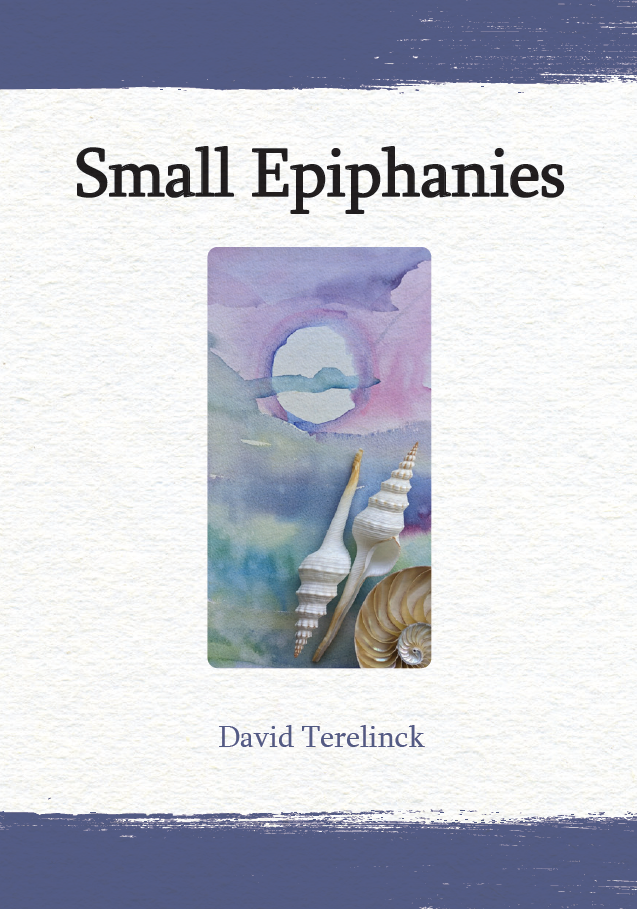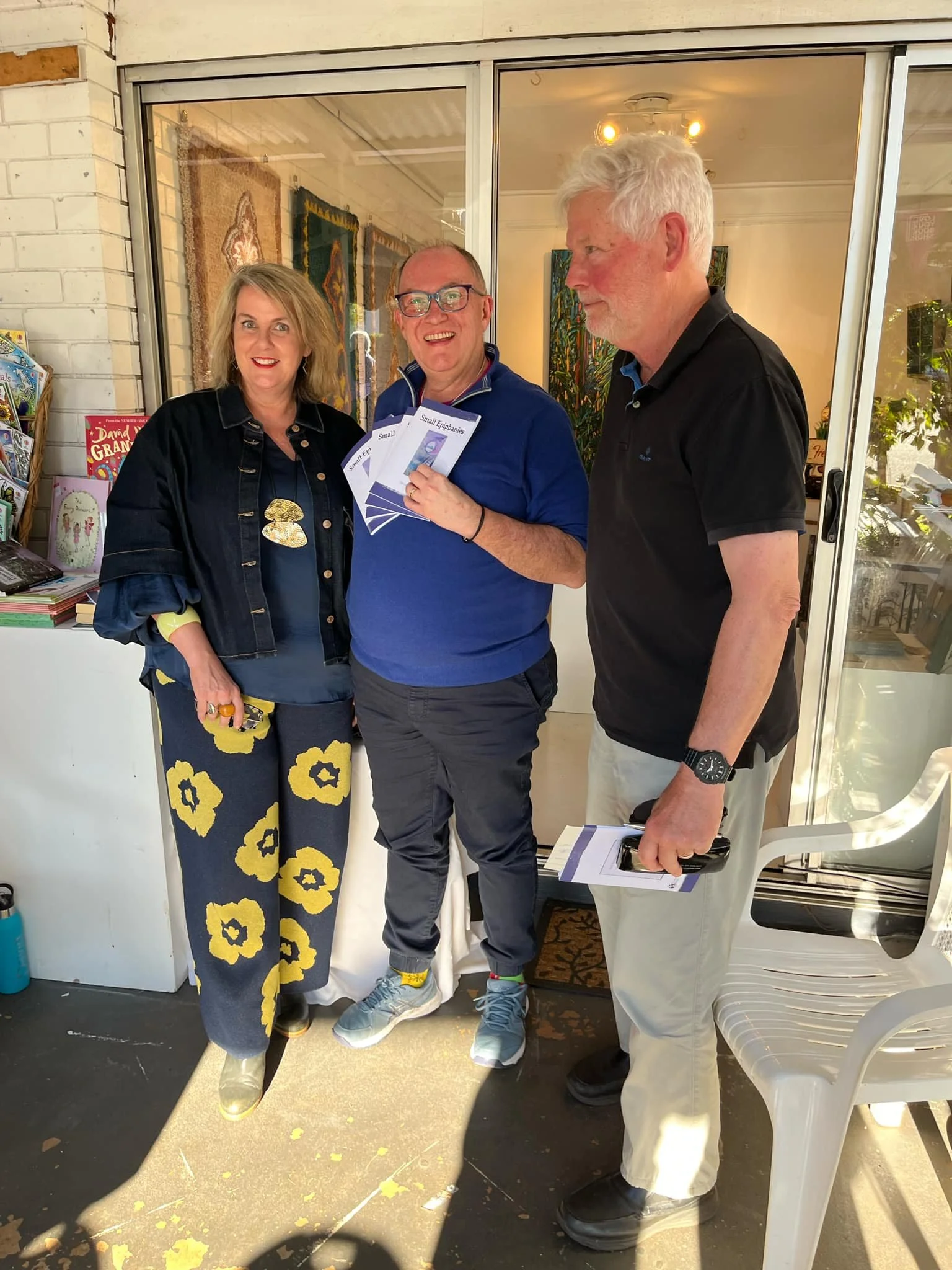A collection of poems that observes and records day-to-day life, and our interaction within nature and the universe. These poems of loss, grief, love, laughter, and hope are infused with small discoveries and moments of awareness around the human condition and the meaning of our existence.
Published by Calanthe Press, August 2024.
Scroll down to read a selection of poems from Small Epiphanies
Small Epiphanies
Nights by the bay are a symphony of wood
and water; the distant slap of an oar
on the skin of the inlet,
bowlines rasp against the bollard.
A sloop mast groans
as a swelling breeze gossips
with the canvas. The jetty
is bleached with moonlight.
Barnacled pilings silently sway,
sullen with their greening beards
and weathered disposition.
The sand is cool and damp.
An incoming tide shackles my ankles
with kelp, dusts my calves
with salt. I breathe the brackish air
and wonder which whales exhaled
the molecules I draw in.
Each step brings offerings:
tormented driftwood
sand-polished sea-glass
shells from distant oceans.
I look up to see a field of stars
campo de estrellas
the Spaniards called it.
And suddenly I believe
the Milky Way could be dust rising
from the blistered feet
of countless pilgrims.
And beyond Santiago de Compostela
lies Finisterre
where the road-weary
find the end of the world
and are new baptised.
Another starfish froths up at my feet,
luminescent jellyfish blob
beyond the break,
and I’m no longer uncertain
of my place in the world.
This place
where small epiphanies are found
in the creak of a midnight hawser,
a quicksilver moonbridge that links
seawall to shore. And it’s enough
to make you almost
(almost)
believe a man
could walk on water.
Clingstone
How softly you hold summer
in your palms, slowly adding each
golden globe to the fruit bowl.
Sunlight sluices the screen door,
alchemies dust motes, insinuates
itself up your leg to gild your thigh.
You hold one out to me. The perfume
ripens a clingstone memory.
And I recall a distant season,
a different girl, just about the time my face
was starting to know the daily kiss
from a razor. There she stood,
on that Georgia backroad,
beside a swayback fruit stand
with a hand-lettered sign:
fresh peeches 4 sale.
Her faded sundress clung to perfect
dangerous curves.
From the portable on the shelf,
beside pails of pecans, Ella crooned
I’m wild again, beguiled again,
a simpering, whimpering child again . . .
As she slowly swayed her hips
she picked up a sun-warmed peach,
bit into plump flesh, held it out as juice
dribbled down her chin, dripped
from hand to dusty sandaled feet.
That was the summer I discovered
the intimate geography
painted by Renoir and Rubens.
The summer I found women
could be sweet satisfying
and without them ever knowing it
they could leave a lasting bruise.
A Saint in Cobalt & Ochre
after The Milkmaid (1657-1658)
oil on canvas, 46cm x 41cm
— Johannes Vermeer
There is prayer in this woman.
Prayer that needs no utterance.
Up before Matins, whilst the house
still slumbers, she labours
away the shadowed hours
shoulder welded to the flank
of cow after cow.
Her thick sinewed arms
drive the heels of roughened hands
into the dough. Over and over.
These are not chores,
but benedictions to life.
And her kitchen now smells
of hay and heifer
the innocence
of daily bread.
This is no milkmaid.
No kitchen helper.
She is no less than a saint,
proclaimed in cobalt
& ochre,
centered in her own world.
A world where pouring milk
becomes devotion.
A world where holding
the belly of a jug
(ever so gently)
makes us quietly weep
for the faith we’ve lost.
David signing copies of Small Epiphanies at the launch on 25 August 2024 at Under the Greenwood Tree Bookshop & Art Gallery Tamborine Mountain.
David with poet Dr. Jane Frank, who launched Small Epiphanies, and Calanthe Press editor, Jock Macleod.
Love of the small, beautiful details: Jane Frank launches ‘Small Epiphanies’ by David Terelinck
Small Epiphanies, by David Terelinck, Calanthe Press 2024, was launched by Jane Frank at Under the Greenwood Tree Bookshop and Art Gallery, Tamborine Mountain on 25 August 2024.
When we were talking, David told me that his inspiration for writing poems is often a single word, or a sound, or a smell or an overheard snippet of conversation – a tiny thing. A wonderful example of this is ‘Clingstone’ that begins, “How softly you hold summer / in your palms, slowly adding each / golden globe to the fruit bowl” — the sight of peaches bringing a vivid memory of youth and Ella Fitzgerald’s crooning rushing into a poem. There is a lot of fruit in the book! Pomegranates, oranges, lemons and of course forbidden fruit! Also flowers! David is drawn to fruit and flowers for their richness, colour and the whole idea of bounty.
But I think it is also because they belong, once picked, to the domestic realm and so many of David’s poems are about appreciation of the intimacy of work and domestic comforts. I think it might be (at 13 lines) the shortest poem in the book but I love the poem ‘Garnish’ which I thought I would read out . . .
Click on the tab below to read the full review published in Rochford Street Review.
Where meaning lies: ‘Small Epiphanies’ by David Terelinck reviewed by Kimberly K. Williams
David Terelinck’s first book of poetry, Small Epiphanies, is exactly what the title promises to be: a collection of poems which observes and records daily life. These poems show readers that the examination of the daily is where meaning lies. Within the lines and images are themes of the influence of religion, God (which, in these poems, is not to be conflated with organised religion), nature, and people, with the general conclusion that in the interactions of all of the above, we humans discover more about our existence.
The strength of these poems lies in the clear voice which is created by the deliberate use of verbs: “A sloop mast groans / as a swelling breeze gossips / with the canvas…”. These lines from near the beginning of the title poem, which is also the first poem in the book, create a contemplative tone for the remainder of the book. The last lines of the poem are stunning . . .
Click on the tab below to read the full review published in Rochford Street Review.
‘Small Epiphanies’ reviewed by Melissa Ashley in Stylus Lit, September 2025.
Small Epiphanies is the debut poetry collection of Gold Coast poet, David Terelinck. The collection spans a wide range of adventures, passions and emotional states: travel, place, grief, imagination, sex, desire, food, gardens, nature, memory, art and music, just to name a few. Terelinck’s poetry is packed with fresh and original wordplay: judicious rhythms; well buffed verbs; imagery suggestive of vivid texture and light. Aptly novel associations and juxtapositions are everywhere. In ‘Blue Mountains Elegy,’ for example, ‘the melaleuca is bonsaied / by ocean winds and salt’ (38); the sky is ‘a pale blue ceiling / sponged with clouds’ (38) . . .
The ever-watchful eye of Terelinck’s poetic observer lingers and savours the small pleasures and surprises of material, day to day life. Terelinck writes tenderly about imprinted, recognisable childhood pleasures, bringing a smile of nostalgia to the reader



